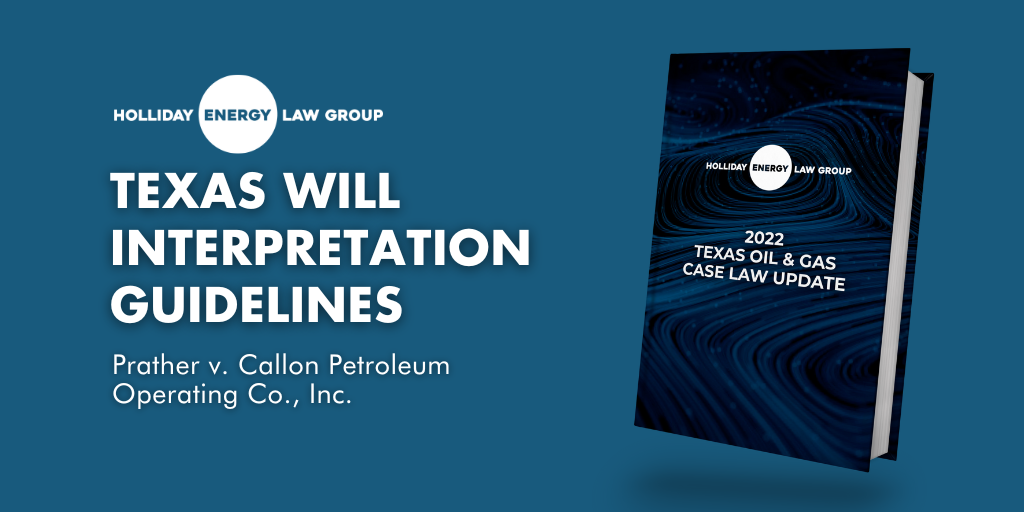Texas Will Interpretation Guidelines

Prather v. Callon Petroleum Operating Co., Inc., 648 S.W.2d 618 (Tex. App.—Eastland 2022, no pet.). Will Construction.
In Prather v. Callon Petroleum Co., the Eleventh Court of Appeals held that the phrase “survivor(s) thereof,” in the context of a testator’s will, constituted words of survivorship. This dispute centered on whether the testator intended the phrase to create a requirement that the listed beneficiaries survive the testator or whether the testator intended the phrase to prevent a lapse, thus allowing the heirs of the designated beneficiaries to take in their place. The court relied on principles of will construction handed down by the Supreme Court of Texas in prior cases and concluded that the phrase created a requirement that the beneficiaries survive the testator in order to take from the will.
Key Takeaways
- Title examiners, take note of wills that require survivorship for beneficiaries to take from a decedent’s estate and their effect on probate distribution.
- Be mindful that Texas rules of will construction require a court to consider the meaning of words contained in a will, not what a testator intended to recite.
- Texas courts also take a holistic view of the intent of the parties as expressed in the instrument at issue.
Origin of the Dispute
Olga Stamps executed her will in 1995 and named Margaret A. Ogden (“Margaret”) and June L. McCasland (“June”) as her sole beneficiaries. In Section II of her will, Olga devised all of her property, including subsequently disputed mineral and royalty interests located in Howard County, to Margaret and June as follows:
I GIVE, DEVISE and BEQUETH unto my children, JUNE LAVELL MCCASLAND and MARGARET A. OGDEN, to share and share alike, all of the property which I may own at the time of my death, real, personal and mixed, tangible and intangible, of whatsoever nature and wheresoever situated, including all property which I may acquire or become entitled to after the execution of this will, including all lapsed legacies and devises or other gifts made by this will which fail for any reason (but excluding any property over which I may have any power of appointment), in fee simple. In the event that one of the beneficiaries in this paragraph is not living at the time of my death, then his or her share shall go to the survivor(s) thereof.
June predeceased Olga. When Olga passed, her will was admitted to probate as a muniment of title. Later, June’s children, Paul and Marcus Prather (the “Prathers”) believing they had inherited June’s share of the disputed mineral interest, executed a series of mineral leases to a third party. These leases were subsequently assigned to Callon Petroleum Co. (“Callon”), who currently operates the leases that include the disputed interests. Afterward, Margaret (who survived Olga) passed, and her children inherited her share of the disputed mineral interests. Margaret’s children eventually sold their inherited interests to various royalty companies.
After Callon became aware of the competing claims to the disputed mineral interests, it suspended royalty payments pending the resolution of this title dispute. The Prathers thereafter sued Callon for breach of contract based on the suspension of royalty payments allegedly due to them. The royalty companies then intervened in the suit and claimed superior title to the disputed interests.
Trial Court and Appeal
At the trial court, the Prather's alleged that the phrase “survivor(s) thereof” in Section II of Olga’s will referred to them; therefore, June’s share of Olga’s estate passed to them on Olga’s death.
Conversely, the royalty companies contended that the phrase “survivor(s) thereof” referred only to Olga’s two children, Margaret and June; therefore, because June did not survive Olga and Margaret did, upon Olga’s death, Margaret took Olga’s entire estate under Section II of the will. As such, the royalty companies argued that, as successors to Margaret’s interest by virtue of conveyances from Margaret’s children, they hold superior title to the disputed interests.
In their motion for summary judgment, the Prathers sought a construction of Olga’s will and requested that the trial court (1) interpret Olga’s will in their favor; (2) order Callon to pay the suspended royalties to them; and (3) grant them “such other and further relief” to which they were entitled.
In their cross-motion for summary judgment, the royalty companies sought a judgment to quiet title on the disputed mineral interests.
The trial court granted the royalty companies’ motion for summary judgment, denied the Prather’s motion, and ordered that the Prathers take nothing on all claims they had asserted against Callon and the royalty companies in the underlying suit. The Prathers appealed.
Construction of Olga’s Will
On appeal, the Prathers argued that, to harmonize all sections of Olga’s will and faithfully adhere to her intent, the court must construe the phrase “survivor(s) thereof” in Section II of the will to mean “heirs.” To resolve the dispute, the court turned to the rules of will construction promulgated by the Supreme Court of Texas. Specifically, the court noted that when construing wills, courts focus not on what the testator intended to recite, but on the meaning of the words she actually used. The court further noted that such words, “whether technical or popular,” are construed “in their plain and usual sense, unless a clear intention to use them in another sense” is present in the instrument.
The court of appeals agreed with both parties’ contentions that Olga’s will was ambiguous. The Prathers attempted to resolve the ambiguity by pointing to the fact that Paul Prather was chosen as an alternate executor of her estate. In the Prather’s view, there was no reasonable construction in which “a reasonable [testator] might identify her adult grandson as a potential executor, trustee, and beneficiary in other circumstances but yet wall him off from all estate benefits in the happenstance that his mom was to predecease his grandmother.”
In rejecting this argument the court reaffirmed the rule that a will should be interpreted in its entirety, not piecemeal or in isolation. The Prathers further argued that the conditional plural form of the noun “survivor(s)” in Section II of Olga’s will indicates that she intended the term to mean “heirs” because if either Margaret or June predeceased Olga, there would have been only a singular possible survivor, thus rendering the inclusion of the plural form meaningless. The court dismissed this contention by turning to White v. Moore, where the Supreme Court of Texas rejected the argument that “survivors” and “heirs” are one in the same. To this point, the court simply agreed with the reasoning in White and added that the terms differ and are not interchangeable.
Holding
The Eleventh Court of Appeals held that, undoubtedly, Olga required survivorship as a condition of either Margaret, June, or both of them taking under Section II of the will. In so holding, the court declared that common sense dictates that a “survivor” is one who remains alive or survives an event and that the court cannot conceive a contrary interpretation. Thus, because only Margaret was surviving at the time of Olga’s death, she alone took Olga’s estate under Section II.
For a more detailed insight into the 2022 Texas Oil & Gas Case Law Update, download the HELG paper.


